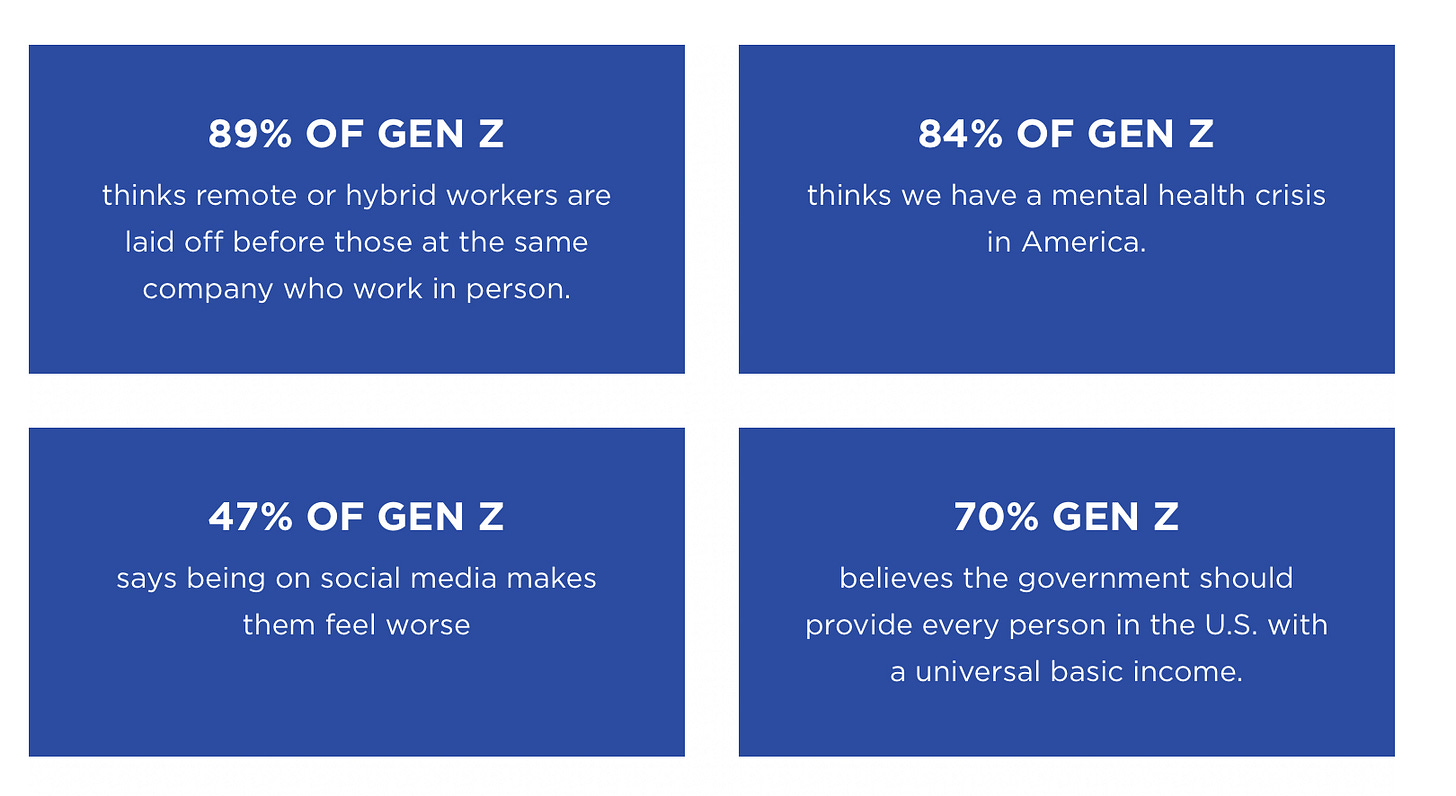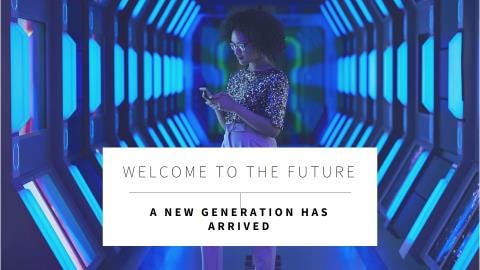As Generation Z (born between 1997 and 2012) enters the workforce, it's essential to understand their unique characteristics, values, and preferences. Gen Z is distinct from millennials, and adapting to their needs can improve engagement, productivity, and workplace culture. Here's a guide to what professionals should know about Gen Z and how to work effectively with them, backed by updated insights from the 2024 Deloitte Gen Z and Millennial Survey.
In a Nutshell:
According to the 2024 Deloitte Global Gen Z and Millennial Survey, mental health is a significant issue for Gen Z, with key statistics and data including:
40% of Gen Zs report feeling stressed all or most of the time.
Only 51% of Gen Zs rate their mental health as good or extremely good, indicating substantial room for improvement.
Around 39% of Gen Zs say their mental health has improved over the past year, but 18% report it has worsened.
Top contributors to stress include long-term financial security (50%), day-to-day finances (45%), and the health and welfare of family (46%).
In the workplace:
36% say their job contributes significantly to their stress, with 51% feeling stress due to long working hours and inadequate recognition for their efforts.
54% of Gen Zs believe their employers take mental health seriously, but only about 56% feel comfortable speaking openly about mental health with their managers.
These statistics emphasize that mental health remains a critical concern for Gen Z, with calls for better workplace support and broader societal awareness.
1. Digital Natives
Tech-savvy and fast adopters: Gen Z is the first generation to grow up with the internet, smartphones, and social media. They are proficient with technology and expect seamless digital experiences in their work environments.
Tip: Provide up-to-date technology and digital tools to enhance work efficiency.
Insight: Gen Z expects technology to be central in their work environments. Many utilize tools like Generative AI (GenAI) in their daily work, with 26% of Gen Z using GenAI regularly. These tools foster productivity and work-life balance.
2. Pragmatic and Financially Conscious
Value job security and stability: Unlike millennials, who may prioritize passion over pay, Gen Z seeks financial stability and is more cautious about taking risks.
Tip: Offer competitive salaries, transparent career paths, and financial growth opportunities.
Study: 48% of Gen Z expect their personal financial situation to improve in the next year, reflecting cautious optimism. However, 30% feel financially insecure, and more than half live paycheck-to-paycheck, making salary and benefits a top priority.
3. Strong Advocates of Diversity and Inclusion
Diverse backgrounds and inclusive values: Gen Z is the most racially and ethnically diverse generation in U.S. history and expects workplaces to reflect that diversity.
Tip: Create an environment where diversity is celebrated. Implement Diversity, Equity, and Inclusion (DEI) programs and allow space for open discussions.
Study: About 75% of Gen Zs believe that an organization’s societal impact and community engagement are critical when considering an employer.
4. Mental Health Awareness
Mental health matters: Gen Z is more open about mental health struggles and expects employers to offer resources that support emotional and mental well-being.
Tip: Provide mental health days, flexible schedules, and access to wellness programs.
Study: Stress levels have slightly improved, but 40% of Gen Z report feeling stressed most of the time. Poor work-life balance and job-related issues such as lack of recognition contribute to this stress.
5. Desire for Authenticity
Reject traditional hierarchies: Gen Z values authenticity and transparency in leadership and prefers collaborative, flat structures where they can communicate openly with senior staff.
Tip: Foster open dialogue and provide regular feedback. Be transparent about business decisions and leadership practices.
Insight: 44% of Gen Zs have turned down an assignment or potential employer due to ethical concerns, emphasizing the need for companies to stay aligned with their values.
6. Purpose-Driven
Seek meaningful work: Gen Z prefers to work for companies that contribute to a larger purpose and have a positive social impact. They are particularly drawn to businesses that prioritize sustainability, ethical practices, and social justice.
Tip: Engage Gen Z by linking their work to broader company goals and involving them in corporate social responsibility (CSR) initiatives.
Study: 86% of Gen Zs say having a sense of purpose is crucial to their job satisfaction and well-being.
7. Embrace Work Flexibility
Remote and hybrid work preferences: After the pandemic, Gen Z is more inclined toward flexible work arrangements, valuing both in-person interactions and remote flexibility.
Tip: Offer hybrid work models or flexible hours, enabling them to balance work and personal life.
Study: 64% of Gen Zs now work in organizations that have implemented return-to-office mandates. While some find increased connection and routine, others experience stress and decreased productivity.
8. Continuous Learning
Eager for skill development: Gen Z seeks continuous learning opportunities and emphasizes skill development to stay relevant in the workforce.
Tip: Invest in professional development, mentorship programs, and online learning platforms to help them grow.
Study: 59% of Gen Zs believe they will need to reskill due to automation and emerging technologies like GenAI.
Key Takeaways for Working with Gen Z:
Embrace technology: Equip your workplace with modern tools and platforms for digital collaboration.
Foster a culture of diversity: Prioritize Diversity, Equity, and Inclusion to meet their expectations.
Support mental health: Provide resources and foster an environment that promotes mental well-being.
Offer flexibility: Allow for hybrid or flexible work options to attract and retain talent.
Align with purpose: Ensure your company’s values align with social causes important to this generation.
By understanding Gen Z's values and work preferences, organizations can create an environment that attracts and retains top talent from this dynamic generation. With an open mind and adaptability, businesses can benefit from their innovation, digital fluency, and fresh perspectives.
Resources with further insights on how to lead the next generation with mental health initiatives:
Understanding and Working with Generation Z: Leading and Retaining Gen Z Employees: Strategies for Modern Workplace Success.
Transformational Leadership and Employee Mental Health: Positive Leadership Case Studies with Playbook Guide
Addressing Substance Use in the Workplace: A Comprehensive Guide for Human Resources Professionals
Solution-Focused Strategies to Combat Employee Burnout
Addressing Employee Burnout: Solution-Focused Techniques for HR Professionals.
I currently teach in person personal & professional development courses for The University of Tennessee Center for Professional Education and Lifelong Learning in Knoxville. Learn more about my in person courses HERE.
Enroll your team in a group subscription for valuable 🆙 skilling resources focused on mental health, including essential tips for burnout prevention!
➼ I work with professionals to enhance their mental well-being to build resilience, manage stress, and achieve a balanced, fulfilling life.







Check out additional resources, in our article, to equip your workforce to lead the next generation with a mental health playbook that includes having conversations about substance use disorder.